California fires: For one man in the Camp fire evacuation zone, caring for animals and checking properties keep him busy

Caring for animals and checking properties keep one man in the Camp fire evacuation zone busy
Jeff Evans steers his white Dodge Ram along a narrow dirt road, scanning the blackened trees and ashen ground for two skittish dogs.
They come running when they hear the truck, and Evans offers them dog biscuits from the big red box of Milk-Bones he keeps on his floorboard. Good, he said, giving them a pat. They’re doing OK. He can move along.
Checking on the dogs is just one chore on Evans’ list. He’s one of a handful of people left in Concow, Calif., a mountain hamlet tucked deep in the woods that has been under mandatory evacuation orders since the Camp fire tore through here Nov. 8. If he leaves, he can’t get back in.
His neighbors stuck on the outside have been emailing him requests. Because the gas in the generator powering his electricity — and his internet — is limited, he hops online for a few minutes each day, answers their questions and gets going.
“Every single morning until the afternoon, I’m huffing it,” Evans said. “I’m going and going and going. There’s pigs to feed and goats and ducks and chickens.”
Not to mention the eight dogs he’s rescued.
“We’re stuck here anyhow,” he added. “We may as well do something valuable.”
A thin man with a bushy mustache and a quick laugh, Evans, 59, has become an unofficial keeper of Concow. Neighbors send him addresses and ask if he could please go see whether their houses burned down. Almost always, the answer is yes.
From Chico, the nearest city outside the massive evacuation zone, thick smoke obscures the Sierra foothills towns and their devastation.
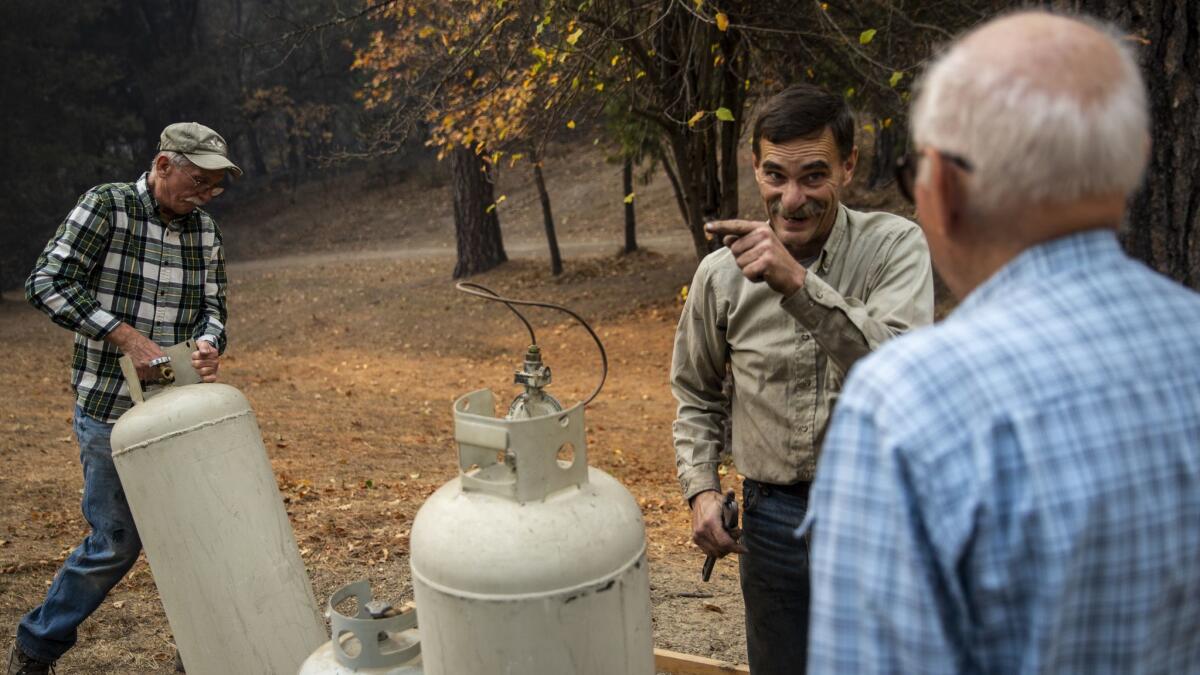
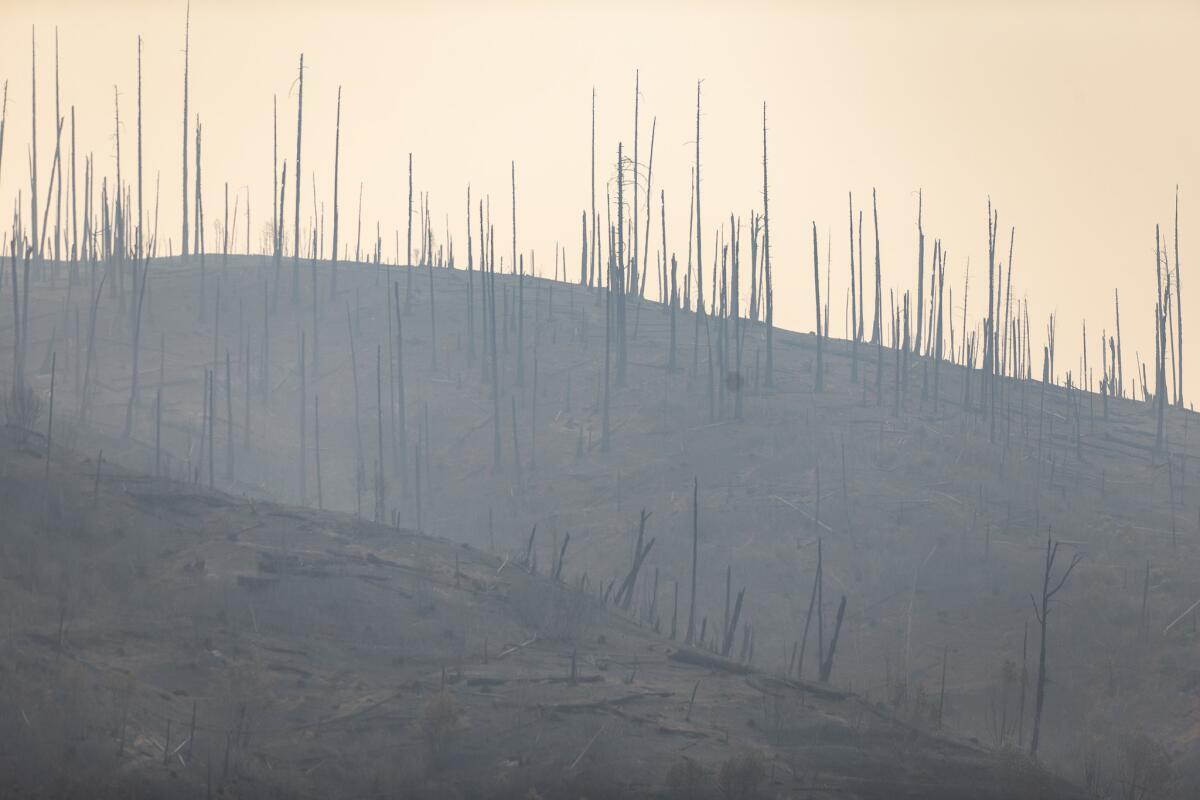
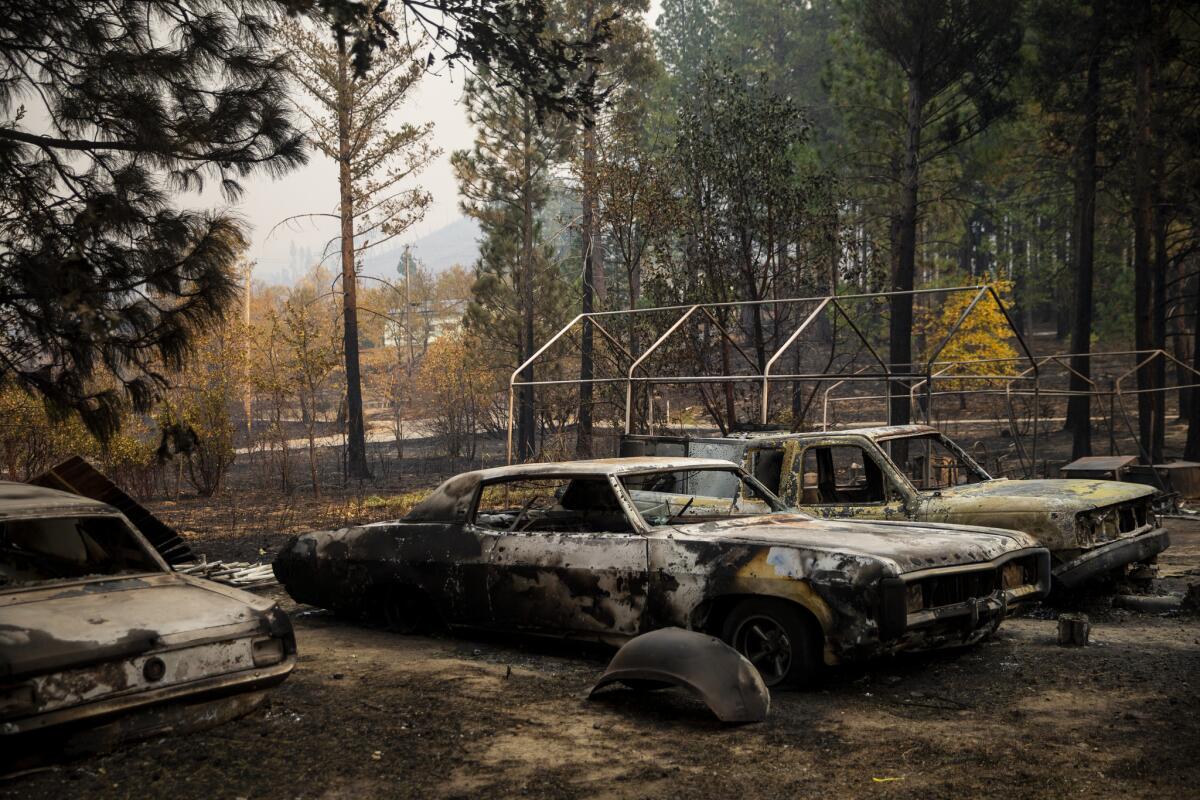
This week, a drive up to Concow, an unincorporated community of 710 people, included stops at closed intersections guarded by military police. At burned-out houses all along the way, search teams picked through the rubble for human remains, their white coveralls making them look like ghosts in the smoke.
Evans, who owns a Chico pest control company, lives in a three-bedroom house at the end of a dirt road, his property abutting Concow Reservoir. He’s been there 22 years and still can’t believe his luck. He can catch 6-pound bass right in his backyard.
About a year ago, he moved his parents, Chuck, 91, and Janet, 82, in with him. Janet is hard of hearing and moves slowly with a walker. Chuck chops the wood and keeps the gutters clean.
“He told me I could move down here and retire and not have to do anything,” Chuck said. “That was a crock.”
About 7:45 a.m. on Nov. 8, Evans and his dad stepped outside and saw that the skyline was orange. Already, smoke filled the air. The wind was blowing hard.
What started as a tiny brush fire became the state’s deadliest wildfire. Here’s how »
Chuck drove a quarter of a mile north up Eleran Lane to Hoffman Road — the only way out — to see how it looked. He saw flames. They were trapped.
He and Evans considered their options. Maybe they could get in the reservoir? No, Janet can’t swim. They’d have to protect the house.
Evans, his dad and a few neighbors spent a frantic morning with tractors, rakes and shovels cutting firebreaks and tossing dirt on the flames that came from all directions.
“We kind of admitted to one another that there’s a possibility that we’re not going to make it through this,” Evans said. “I mean, if you stood here and heard that sound, this freight train huffing and puffing just unbelievably loud — we realized that this is volatile.”
He and his dad stopped for a few seconds to consider that they might die. Then they started working again. They didn’t want to worry Janet, so they didn’t tell her how bad it was. She sat inside, playing solitaire at the kitchen table.
Evans said the fire burned his eyebrows.
“It’s too bad it didn’t burn your mustache,” Chuck said with a crescendoing laugh.
The next day, Evans drove a mile up Hoffman Road to the crossing at Concow Creek on the path they would have taken out. There were five abandoned vehicles and dogs inside.
He took the dogs home and posted their pictures on Facebook. Their owners all contacted him, some weeping with joy, and told him the same story: At about the same time Evans’ father was telling him they were trapped, the drivers up the road became surrounded by flames.
Suddenly, they saw a California Department of Forestry and Fire Protection pickup truck just ahead and heard a man calling out. Then, a canoe pulled up on the water. They’d have to leave now. There was no room for dogs.
A week after the fire, 11 dogs, including three of Evans’ own, crowded his kitchen floor, tails wagging. Some lay next to each other, sleeping. They were strangers, but they have been getting along. Evans thinks “they get it.”
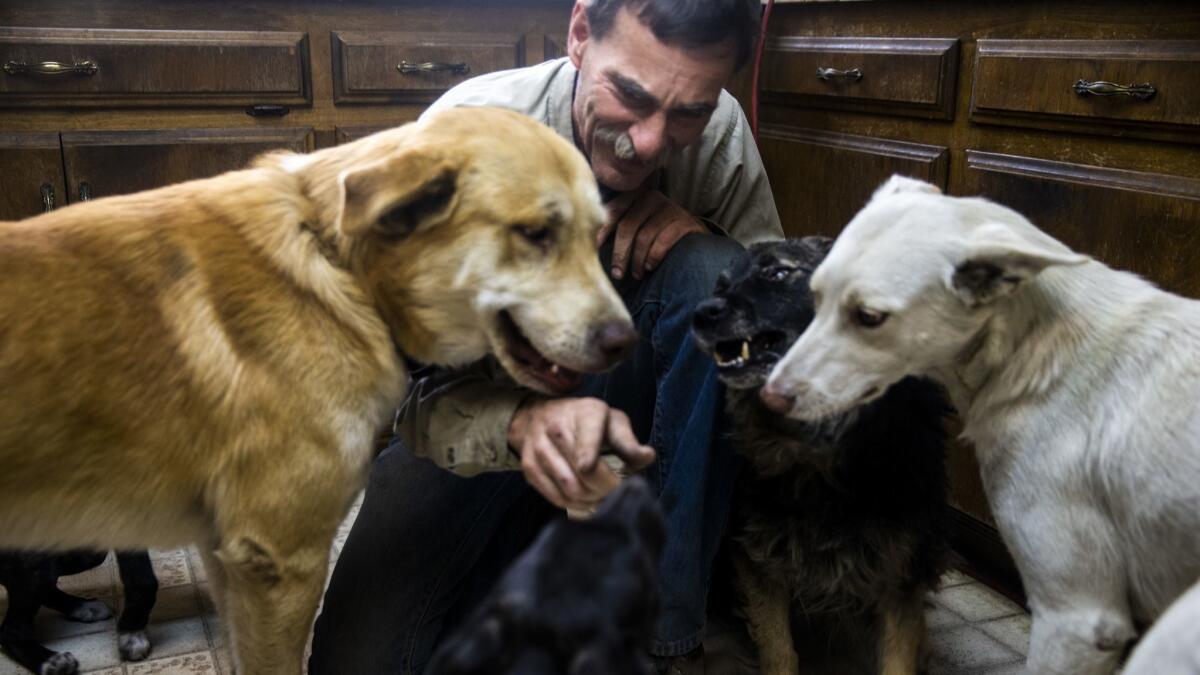
A black collie mix named Bella has matted, singed fur all over her back and tail, and her eyes are burned. Evans found her at his friend’s house, cowering in a hole, scared as could be. She was tied to a long lead line in the yard while her owners were at work. Her doghouse burned down.
“She lived through that,” Evans said, gently petting her face. “That’s just mind-blowing to me. She’s such a good-hearted creature.”
Later that week, a group of donkeys wandered into the yard. Chuck gave them peppermint candies, and they followed him around.
On Thursday afternoon, Evans started his rounds. He drove to the house of Glenn Madsen, Bella’s owner. As others have been doing, Madsen told Evans to get into his house, which is still standing, to get food. When he pulled up, he was concerned: The gate was open and the generator was running. Did someone break in?
He found his friend in the yard, working in a dust mask, and wrapped him in a hug. Madsen was sheepish about how he got there.
“Glenn, I saved everything in your freezer,” Evans said. “All the meats, they’re still frozen.”
“Are you serious?”
“They’re in my freezer. So if I need, I’ll eat them, but I think we’re going to do fine. So when it’s all said and done, I’ll bring those back.”
Evans took half a bag of potatoes from Madsen’s house, and Madsen gave him 10 gallons of gas for his generator. Evans was relieved. He’d only had five gallons left — enough for a day of electricity.
Evans drove up the road and ran into another friend checking on a burned property. He’d gotten word that an older man they’d all helped look for had been found dead under his pickup truck.
“I expected it,” Evans said with a sigh. “He doesn’t have the facility to drive too far, too fast.”
As he drove along Concow Road, he passed the burned husk of a four-door pickup.
“Someone died there,” he said softly.
He pulled into Camelot, a gated subdivision where houses were built in a tighter, planned grid that was meant to attract wealthy buyers but was too isolated to really do so. After the fire, Camelot is no more.
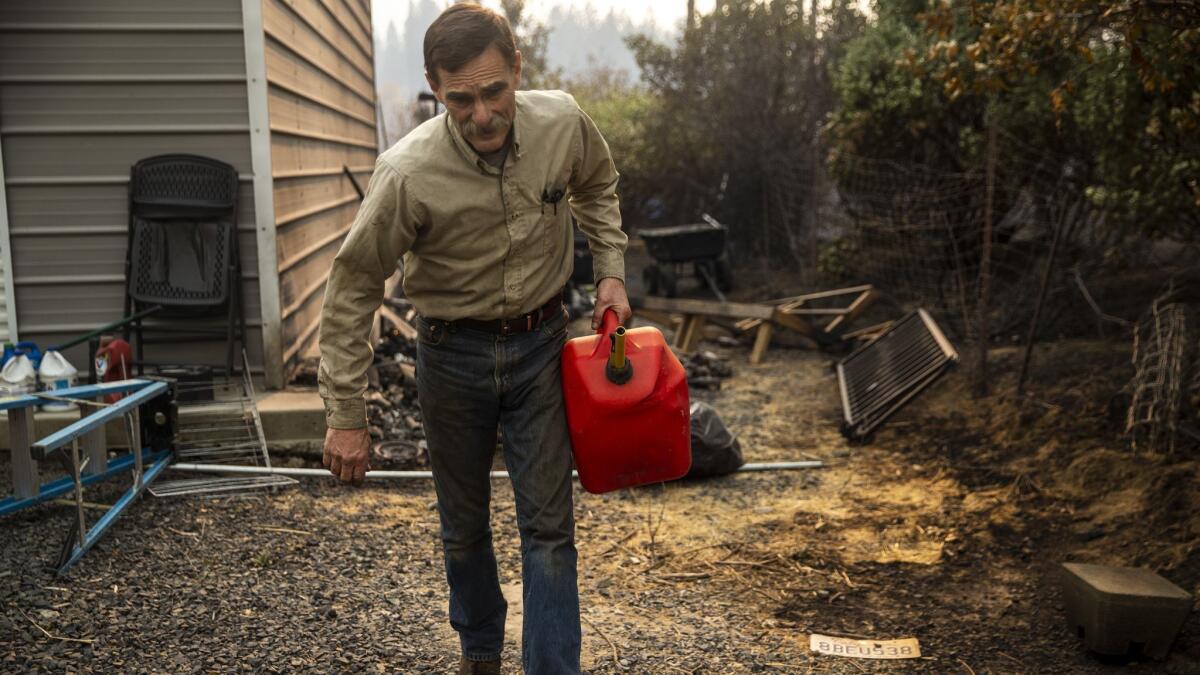
He checked a burned home where he’d left food for a badly burned stray cat he had spotted a few days earlier. The food hadn’t been touched.
“I think the cat died,” he said, his voice breaking. “Doggone it. I just hate to see animals suffer.”
Just up the road, he brightened up. There was another stray cat in good shape. He ran and grabbed two of the three cans of Fancy Feast he’d left out and crawled down a culvert where the cat was hiding.
“Kitty, kitty, kitty!” he called. “Here you go, buddy.”
“I love that,” he said in the truck. “I love that!”
In the week since the fire, he’s gotten to know many of the multitudes of firefighters and utility workers, who now recognize him. Some bring him gas they find on others’ properties. He asks for the address so he can replenish it when the neighbors come back.
“But they say, ‘They’re never going to need it because there’s nothing there,’ ” Evans said.
On Friday, firefighters delivered him supplies sent from some friends on the outside: Canned goods, peanut butter, toilet paper, 10 gallons of gasoline.
People around here get a reputation that they’re backward, and some look a little rough, Evans said. But you wouldn’t find kinder people anywhere, he said.
“You don’t judge a book by the cover in this neck of the woods, I’ve gotta say,” Evans said. “They’re damn good people.”
When Evans got home, his dad said some utility workers told him it would be at least Christmas before they got lights.
But the dark up here isn’t so bad, Evans said. You can see the stars.
hailey.branson@latimes.com | Twitter: @haileybranson
Start your day right
Sign up for Essential California for news, features and recommendations from the L.A. Times and beyond in your inbox six days a week.
You may occasionally receive promotional content from the Los Angeles Times.




